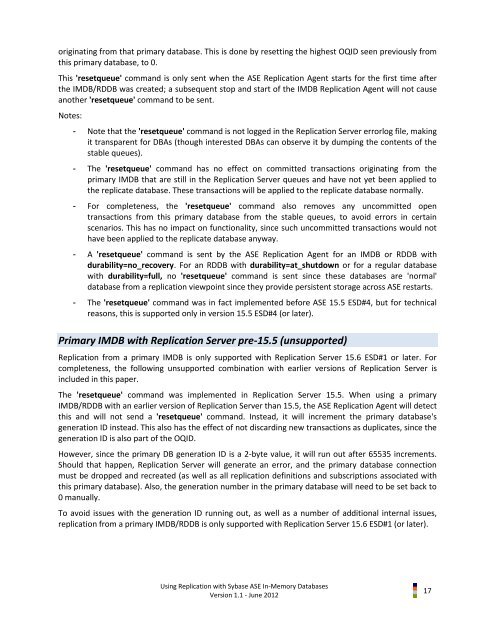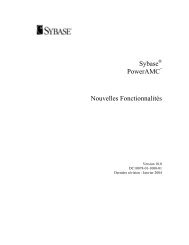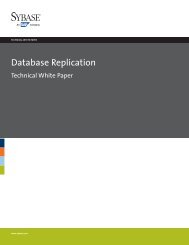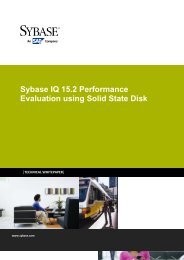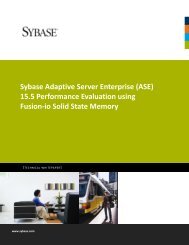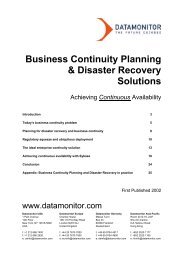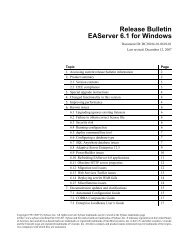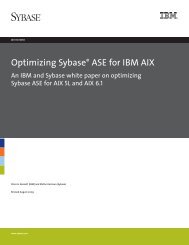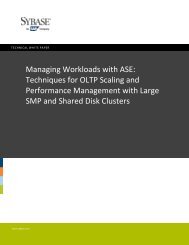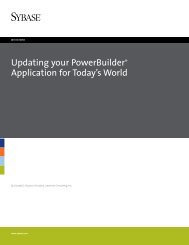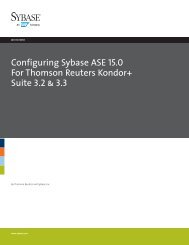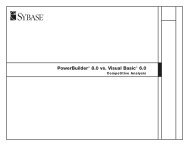IMDB Replication - Sybase
IMDB Replication - Sybase
IMDB Replication - Sybase
You also want an ePaper? Increase the reach of your titles
YUMPU automatically turns print PDFs into web optimized ePapers that Google loves.
originating from that primary database. This is done by resetting the highest OQID seen previously from<br />
this primary database, to 0.<br />
This 'resetqueue' command is only sent when the ASE <strong>Replication</strong> Agent starts for the first time after<br />
the <strong>IMDB</strong>/RDDB was created; a subsequent stop and start of the <strong>IMDB</strong> <strong>Replication</strong> Agent will not cause<br />
another 'resetqueue' command to be sent.<br />
Notes:<br />
- Note that the 'resetqueue' command is not logged in the <strong>Replication</strong> Server errorlog file, making<br />
it transparent for DBAs (though interested DBAs can observe it by dumping the contents of the<br />
stable queues).<br />
- The 'resetqueue' command has no effect on committed transactions originating from the<br />
primary <strong>IMDB</strong> that are still in the <strong>Replication</strong> Server queues and have not yet been applied to<br />
the replicate database. These transactions will be applied to the replicate database normally.<br />
- For completeness, the 'resetqueue' command also removes any uncommitted open<br />
transactions from this primary database from the stable queues, to avoid errors in certain<br />
scenarios. This has no impact on functionality, since such uncommitted transactions would not<br />
have been applied to the replicate database anyway.<br />
- A 'resetqueue' command is sent by the ASE <strong>Replication</strong> Agent for an <strong>IMDB</strong> or RDDB with<br />
durability=no_recovery. For an RDDB with durability=at_shutdown or for a regular database<br />
with durability=full, no 'resetqueue' command is sent since these databases are 'normal'<br />
database from a replication viewpoint since they provide persistent storage across ASE restarts.<br />
- The 'resetqueue' command was in fact implemented before ASE 15.5 ESD#4, but for technical<br />
reasons, this is supported only in version 15.5 ESD#4 (or later).<br />
Primary <strong>IMDB</strong> with <strong>Replication</strong> Server pre-15.5 (unsupported)<br />
<strong>Replication</strong> from a primary <strong>IMDB</strong> is only supported with <strong>Replication</strong> Server 15.6 ESD#1 or later. For<br />
completeness, the following unsupported combination with earlier versions of <strong>Replication</strong> Server is<br />
included in this paper.<br />
The 'resetqueue' command was implemented in <strong>Replication</strong> Server 15.5. When using a primary<br />
<strong>IMDB</strong>/RDDB with an earlier version of <strong>Replication</strong> Server than 15.5, the ASE <strong>Replication</strong> Agent will detect<br />
this and will not send a 'resetqueue' command. Instead, it will increment the primary database's<br />
generation ID instead. This also has the effect of not discarding new transactions as duplicates, since the<br />
generation ID is also part of the OQID.<br />
However, since the primary DB generation ID is a 2-byte value, it will run out after 65535 increments.<br />
Should that happen, <strong>Replication</strong> Server will generate an error, and the primary database connection<br />
must be dropped and recreated (as well as all replication definitions and subscriptions associated with<br />
this primary database). Also, the generation number in the primary database will need to be set back to<br />
0 manually.<br />
To avoid issues with the generation ID running out, as well as a number of additional internal issues,<br />
replication from a primary <strong>IMDB</strong>/RDDB is only supported with <strong>Replication</strong> Server 15.6 ESD#1 (or later).<br />
Using <strong>Replication</strong> with <strong>Sybase</strong> ASE In-Memory Databases<br />
Version 1.1 - June 2012 17


